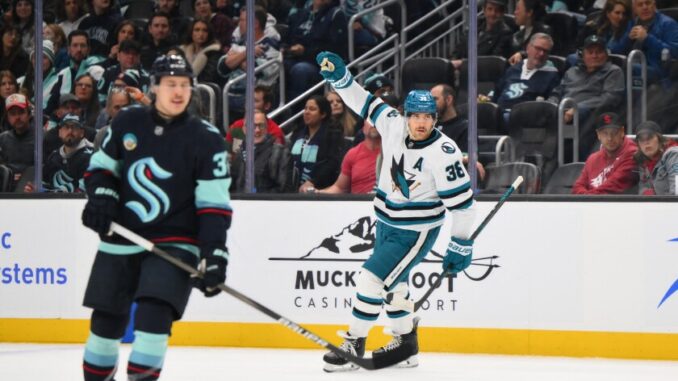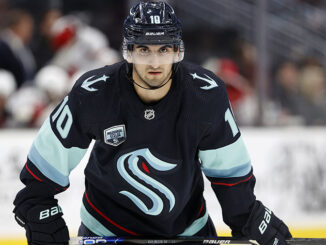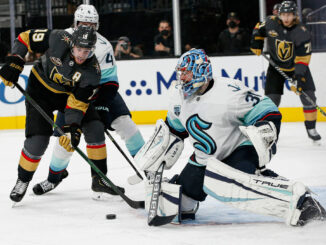
The Seattle Kraken’s 4-2 loss against the San Jose Sharks (Nov. 2) marked the team’s 25th game of the season, a few games past the quarter point of the 2024-25 season. At this juncture, taking stock of the team’s season to date can offer sharper insights baked into a legitimate sample size rather than making proclamations about a single week’s works of games.
Partway through the franchise’s fourth year of existence, the Kraken currently own a record of 11-13-1 and boast a .460 points percentage (PTS%), good for seventh in the Pacific Division, 13th in the Western Conference, and well outside of a playoff spot. The team is carrying a minus-five goal differential heading into the month of December, and it looks like it will be on the periphery of the postseason chase for much of the campaign.
So, what’s led to Seattle’s middling record in year four of the Kraken experience? Let’s dive in.
Grubauer Struggling in Backup Role
What has been a constant across the Kraken’s brief existence is that, despite being one of the league’s highest-paid goaltenders, 33-year-old Philipp Grubauer is once again failing to deliver an adequate return on investment.
Of the 66 goalies to have played in at least five games this season, the veteran German netminder ranks 62nd in save percentage/SV% (.862), 58th in goals-against average/GAA (3.62), and 62nd in goals saved above expected/GSAx (minus-6.9).
Related: Daccord Should Have Permanent Role As Seattle Kraken’s Starting Goalie
New head coach Dave Bylsma alternated between Grubauer and Joey Daccord to start the season, but the latter has pulled away with the starting job. Daccord has made 17 starts to Grubauer’s eight through 25 games and is carrying a .912 SV% and a plus-9.1 GSAx, both top-20 marks among all qualified goaltenders.
Barring a trade with a significant sweetener, it’s unlikely that general manager Ron Francis will be able to find any takers for Grubauer, given his cap hit ($5.9 million) and the term left on his deal (two more after this one). The Kraken will have to live with the volatility, which will limit their ceiling for the duration of the contract.
Kraken Seeing Mixed Results for Free Agent Additions
With an eye toward bolstering an offense that only scored 2.65 goals per game during the 2023-24 season (29th in the league), the Kraken made a splash in free agency by signing Brandon Montour($7.14 million cap hit) and Chandler Stephenson ($6.25 million) to hefty seven-year contracts.
Montour’s market value saw a massive leap coming off of a Stanley Cup championship with the Florida Panthers, as well as ranking 18th among defensemen in points per game over the past two seasons.
The 30-year-old has delivered on his side of the bargain so far. Montour has tallied seven goals (tied-second among defensemen) and 16 points (16th) in 24 games while quarterbacking the Kraken’s top power play unit with Vince Dunn sidelined for much of the early part of the season.
Montour shouldered most of the workload and led all Kraken blueliners in average ice time in all situations. He also ranks first or second among the team’s defenders in every shot- and chance-share metric at five-on-five, acting as Seattle’s standard-bearer at both ends of the ice.
On the other side is Stephenson, who won the Stanley Cup with the Vegas Golden Knights in 2023. The utility forward cashed out as a free agent, with his positional versatility and production (three seasons of 51 points or more) setting him up for a significant payday this past offseason.
Some were weary of handing Stephenson such a deal because it was unclear how much of his production was a byproduct of playing with some of the league’s top forwards, Mark Stone and Jack Eichel.
Stephenson is once again scoring at a 50-point pace but is sporting a gaudy minus-10 plus-minus rating and is underwater by every shot and chance metric at five-on-five. The Kraken have only controlled 45% of all shots and 38% of high-danger scoring chances with Stephenson on the ice, with both marks being either the worst or second-worst among all regular Kraken forwards.
That level of output is unacceptable for a minor-league call-up, let alone the second-highest-paid forward on the team. There were warning signs suggesting that a long-term contract wouldn’t age well, but few envisioned the deal looking this bad this soon.
Kraken Special Teams Not Inspiring Confidence
Judging by the team’s record, it should be no surprise that the Kraken have struggled with special team play. Their power play is converting on only 15% of all opportunities – the third-worst mark in the league – while the penalty kill is slightly better with a 78.7% success rate, coming in at slightly below average league-wide.
The power play clearly suffers from a lack of star power, given that Jared McCann is the only player on the roster to have ever posted a 30-goal season in Seattle, but the underlying strategy hasn’t generated enough to overcome that deficiency.
The Kraken rank in the bottom half of the NHL by shots, expected goals, scoring chances, and high-danger chances per-60-minutes with the man advantage. Even Alexander Ovechkin, in his prime, wouldn’t look great with that rate of offensive generation.
The pattern has repeated itself on the penalty kill, where the Kraken sits 28th or lower in each of the aforementioned categories on the defensive end. It’s a miracle that the Kraken don’t grade out worse, given the quantity and quality of chances they are bleeding nightly.
Seattle’s goaltending while shorthanded has masked an otherwise sieve-like penalty-killing scheme, with their .886 SV% in such situations ranking third in the entire league.
The beauty of special teams is that operating at high efficiency with those units can paper over notable cracks during five-on-five play. The Kraken have not done so and have unsurprisingly trudged through the season’s first quarter.
Kraken 2024-25 Season a Story of Streaks
One of the enduring arguments in the world of sports revolves around how much of a factor confidence or momentum is in a team or individual’s results. Whichever side of the debate one subscribes to, there should be little disagreement with the claim that the Kraken have not done themselves any favours this season.
Looking at a team’s results and claiming that they are only doing poorly because they haven’t won more games consecutively is a bit reductive, but there is a kernel of truth hiding within.
Related: Seattle Kraken – Is Shane Wright’s Development Trending In The Right Direction?
Including the current three-game slide, the Kraken have had three losing streaks of three games or more. Accomplishing such a feat so soon in the season would usually be a death knell for a team’s playoff hopes, but the Kraken have also strung together two winning streaks of three games or more to partially mitigate the damage.
Six of their losses have been by three goals or more, with four of their wins coming by the same margin. Few teams that run as hot and cold as the Kraken end up being successful, and such a pattern is rarely sustainable throughout a season. It comes with the territory of being a team stuck in the mushy middle, but that shouldn’t be an acceptable excuse for upper management.
Kraken In Danger of Falling Out of Playoff Race
As if the Kraken weren’t already in a tough spot in the playoff race, their schedule for the rest of the season is unforgiving and will make it difficult for the team to make up ground in a competitive conference.
The Kraken own the league’s second-most difficult remaining schedule with 57 games left in the season and face an uphill battle to qualify for the NHL playoffs for the second time since inception. Both MoneyPuck and The Athletic are giving them less than a 20% chance of reaching the postseason, with the mediocre start and rocky road ahead reducing the club’s margin for error.
The Kraken appear to be barreling towards a crossroads at which a decision about the franchise’s trajectory will have to be made. As currently constructed, the team is not good enough to be considered a legitimate Stanley Cup contender, but it has enough talent and depth to avoid bottoming out completely.
The Kraken’s pipeline of highly-touted prospects offers hope for the mid-to-long-term future, but the present remains uncertain. Can they pull out of this current tailspin?
Data courtesy of Evolving Hockey, Natural Stat Trick, and the NHL.




